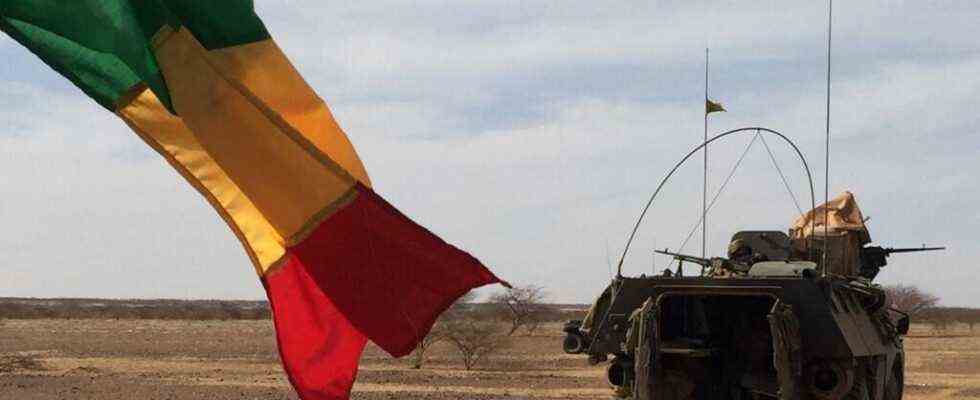Soldiers from the Barkhane force patrol near a Malian flag (illustrative image). – Daphné BENOIT / AFP
- Published Tuesday, a report from Minusma, the UN mission in Mali, estimates that France killed 19 civilians gathered to celebrate a wedding in an airstrike.
- Paris maintains that these assembled men were “identified” jihadists and not civilians. The French Ministry of the Armed Forces once again refuted any blunders.
- This is the most serious questioning of an operation of the anti-jihadist force Barkhane by the United Nations since the beginning of the French engagement in the Sahel, in 2013.
What happened in the Malian village of Bounti? On Tuesday, Minusma, the UN mission in Mali, published the results of an investigation accusing France of having killed 19 civilians, gathered to celebrate a wedding, during an airstrike. Paris disputes any blunders and maintains that they were jihadists. If the report turns out to be correct, what consequences should France expect?
Regarding what happened on January 3 at Bounti, no image has circulated. The facts took place in a remote area where the jihadists are very present. According to testimonies gathered on the spot by investigators, the air strike affected a gathering of men, celebrating a wedding which took place the day before, one kilometer from the village.
Precautionary principle “
The women were preparing the meal. Villagers report a strike from the sky. And the French anti-jihadist force Barkhane was quickly pointed out on social networks. Proven accusations, according to experts from Minusma, who spoke directly to at least 115 people, and by telephone to a hundred others to constitute
their report. “It is the violation of the precautionary principle that is advanced by the report. To put it simply, France is not accused of intentionally killing civilians. She is accused of not having taken all the precautions before this attack to ensure that they were military targets, ”explains Julien Antouly, doctoral student at the Center for International Law (CEDIN) at the University of Paris- Nanterre.
For its part, Paris “maintains with constancy and strongly reaffirms” that “on January 3, the French armed forces carried out an air strike targeting an armed terrorist group identified as such” near Bounti (center). In addition, the Ministry of the Armed Forces “expresses many reservations as to the methodology” of the Minusma, suspecting certain witnesses of being in bad faith or of having been manipulated or threatened.
French justice
Contested or not, at the end of this report, no immediate legal consequences hover over Paris. In conclusion of its investigation, Minusma invites France and Mali to conduct “an independent, credible and transparent investigation” on their side. “It is a commission of inquiry which is not there to judge. The report mentions this on several occasions, it establishes facts and gives its interpretation, ”recalls Julien Antouly.
And then ? “We are in a situation of non-international armed conflict”, indicates the researcher. “In these cases, we tend to think of the International Criminal Court, but in reality, the first judge responsible for judging potential violations of humanitarian law remains the internal judge of each state. It will therefore be up to the French justice to decide and decree possible sanctions and reparations.
It is even an obligation for France: a recent decision of the European Court of Human Rights (ECHR), mentioned in the Minusma report, obliges “States operating on the territory of another State” to “investigate any potential violation that may have been committed by members of their armed forces, prosecute and, where appropriate, punish those responsible for any violations of international law if they were established. “
Political cost
For the army, in addition to the legal consequences, the impact could be political. This investigation is taking place in a particular context, where the Barkhane force in the Sahel is called into question after eight years of existence. “If we believe that international law has been violated, this can weaken the conditions for future strikes. There is a risk of discrediting foreign action in Mali, ”said Jean-Marc Tanguy, journalist specializing in defense issues.
“What happened politically weakens France”, abounds Jean-Pierre Maulny, deputy director at IRIS and specialist in defense issues. “There is necessarily a media war, a war of opinion. The image you give in armed conflict is important. We can see that it is difficult to resolve the problem militarily, that the support of the population in France is not acquired. This kind of information does not help the army, ”he concludes.
Barkhane is currently mobilizing 5,100 soldiers. At the start of the year, Emmanuel Macron, however, paved the way for a gradual decline in this military presence in the Sahel, starting at the end of next summer.

